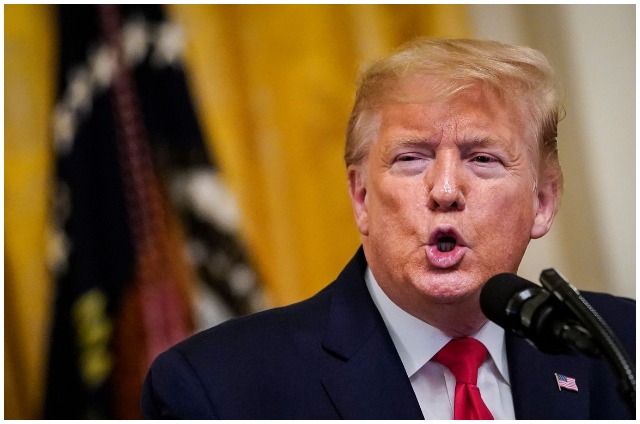Washington – US President Donald Trump signed a revised executive order Monday halting new visas for people from six majority-Muslim countries and suspending refugee admissions for 120 days, the White House said.
The new order takes effect March 16, replacing a January 27 order, which stranded travellers at airports around the world and set off a wave of protests before being blocked last month by a federal court.
Trump’s new action bans tourist, immigration and most other entries to the United States from six countries for 90 days: Iran, Libya, Somalia, Sudan, Syria and Yemen.
US President Donald J. Trump gestures after disembarking Marine One walking on the South Lawn towards the Oval Office of the White House in Washington, DC, on Sunday. (Credit Image: © Erik S. Lesser/CNP via ZUMA Wire) Photo: Erik S. Lesser/dpa
Iraq was on the previous 90-day ban order but is now removed from the list due to enhanced cooperation with the government in Baghdad, the White House said.
The order suspends the US refugee programme for 120 days. An indefinite halt in refugees from Syria is no longer included in the new order.
The executive order cites presidential powers under the Immigration and Nationality Act and says the measures are needed “to protect the nation from terrorist activities by foreign nationals admitted to the United States.”
The first order will be revoked as of March 16.
Homeland Security Secretary John Kelly described the order as “prospective … applying only to foreign nationals outside of the United States who do not have a valid visa.”
“Nothing in this executive order affects current lawful permanent residents or persons with current authorization to enter our country,” he said. “If you have a current valid visa to travel, we welcome you. But unregulated, unvetted travel is not a universal privilege, especially when national security is at stake.”
Chuck Schumer, leader of opposition Democrats in the US Senate, said the measures would have “the same uphill climb in the courts” as Trump’s January 27 executive order.
“A watered down ban is still a ban,” Schumer said. “Despite the administration’s changes, this dangerous executive order makes us less safe, not more. It is mean-spirited and un-American.”
In a background briefing, a senior official from the Homeland Security Department said that the Trump administration believes that the first executive order was “on firm legal foundation.” He said that Trump decided to issue a reworked order that “addresses most of the court concerns” to avoid delays of a drawn-out legal battle.
Earlier Monday in Baghdad, the Iraqi Foreign Ministry voiced “deep relief” that Iraq would not be on the new banned list, spokesman Ahmed Jamal said. The statement described Iraq’s removal from the list as “an important step in the right direction in order to consolidate the strategic alliance between Baghdad and Washington in many areas, most importantly the war on terrorism.”
Secretary of State Rex Tillerson thanked Iraqi Prime Minister Haider al-Abadi for his “positive engagement and support” in implementing what the US described as strengthened vetting.
“The United States welcomes this kind of close cooperation with countries in every region of the world who share our commitment to national security,” Tillerson said. “This revised order will bolster the security of the United States and her allies.”
Attorney General Jeff Sessions said that some 300 refugees in the United States are under federal scrutiny as possible terrorism suspects.
Federal authorities “know that people seeking to support or commit terrorist attacks here will try to enter through our refugee programme,” he said. “In fact, today more than 300 people who came here as refugees are under FBI investigation for potential terrorism-related activities.”
Trump’s revised executive order “protects the American people” by implementing an “enhanced screening and vetting process,” Sessions said.
–dpa











